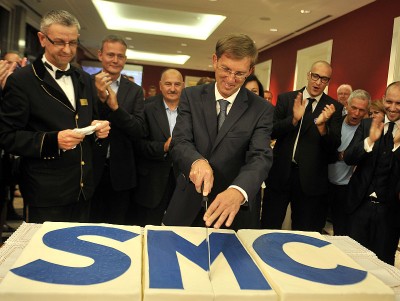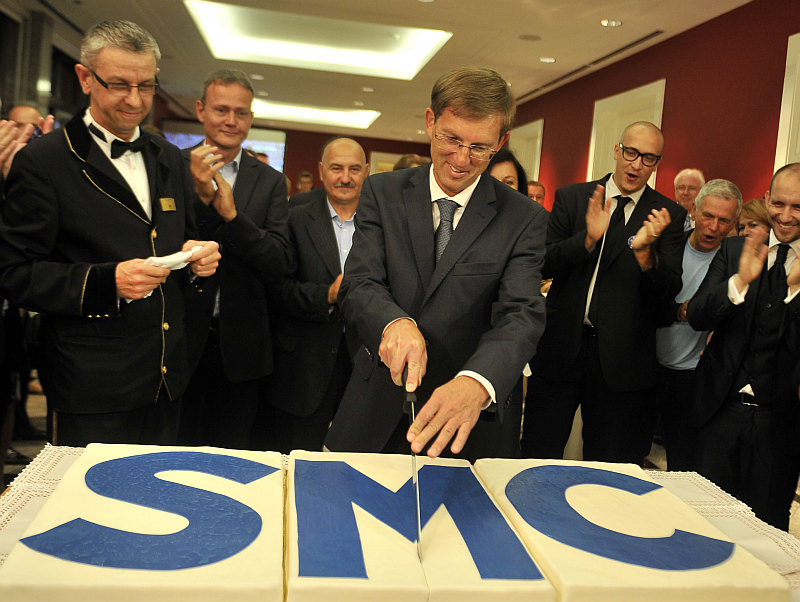 The renowned constitutional scholar Miro Cerar and his party (Stranka Mira Cerarja – SMC) founded only at the beginning of June won the snap parliamentary elections in Slovenia on Sunday, July 13, 2014. The green-liberal SMC came immediately to 34.6 percent of the vote securing 36 out of 90 seats in the Slovenian parliament.
The renowned constitutional scholar Miro Cerar and his party (Stranka Mira Cerarja – SMC) founded only at the beginning of June won the snap parliamentary elections in Slovenia on Sunday, July 13, 2014. The green-liberal SMC came immediately to 34.6 percent of the vote securing 36 out of 90 seats in the Slovenian parliament.
The landslide victory of a political “novice” Cerar came as no surprise though. A 50-year-old Cerar presented himself as a moderate decided to unite the Slovenes in bringing necessary and long overdue changes to Slovenia. As a respected legal scholar appearing in the Slovene media for years Cerar swiftly after creating a political party gained popularity among the Slovenes, which was also reflected in the pre-election polls. Cerar views his victory as a sign that the Slovenes wish to see a “different political culture that is not destructive.” On the election night, the law professor Cerar vowed to overcome the deep left-right political divisions of his country. At the same time, however, he ruled out possibility of a coalition with the leading opposition party, Conservative Democratic Party (SDS), which finished the elections with 20.96 percent in the second place. The imprisonment of SDS-leader Janez Jansa has been a distinctive element of these elections. Jansa, who began his two-year prison sentence for corruption at the end of June, was portrayed by his party as a “political prisoner” and “martyr”. SDS is not willing to accept the results of the elections, declaring them to be “neither free nor fair”.
On July 13, the voters threw ballots to national parliament for the second time within three years and brought seven parties in total to the parliament in Ljubljana. The voter turnout reached new record low with 50.98 percent (compared to 64.7 percent in 2011), which is not only due to summer holidays.
The fact that three out of the seven parties, which have passed a threshold to get into the parliament, were established recently only confirms a deep dissatisfaction of voters in the crisis-ridden Slovenia with the current political establishment. As a result, the voters did not re-elect two former parties that were in the coalition: Positive Slovenia (PS) and Civic List (DL). The DL repeated their dismal result from the European elections, which had prompted its chairman and founder Gregor Virant to resign. In a few weeks, the new party leader Bojan Starman was not able save the party from the free fall. Both the left-populist PS as well as liberal DL were the stars of the 2011 parliament elections, as both ended up in the coalition. Also, the conservative People’s Party (SLS) missed the four percent threshold as it got 3.98 percent.
Despite being part of the former ruling coalition, the best ever election result of 10.21 percent of the votes was achieved by Pensioners’ Party (DeSUS), which is now the third-strongest political party. In the past, DeSUS triggered several coalition crises by opposing structural reforms that would threaten the welfare of pensioners in Slovenia.
Other parties that passed the parliamentary threshold were United Left (ZL – 5.97 percent), Social Democrats (SD – 5.9 percent), New Slovenia – Christian Democrats (NSi – 5.53 percent) and The Alliance for Alenka Bratusek (ZaAB – 4.34 percent), which is a recently created party by the incumbent Prime Minister.
During her 13-month reign, Alenka Bratusek’s government turned from opposing any privatization to deciding to privatize 15 state-owned enterprises. This U-turn was a result of wide imbalances in the Slovene budget, where she was not prepared to undergo the necessary cuts on the expenditure side. After Zoran Jankovic was re-elected as a party leader of Positive Slovenia in May, Bratusek had no coalition anymore since due to Jankovic’s corruption charges other coalition parties were unwilling to stay in coalition with Positive Slovenia.
Slovenia, which was in the 90s the front-runner among the East European post-communist countries, had been hit particularly hard by the financial crisis, where the main reason was the internal banking crisis spurred by bad loans (to some estimates more than 20 percent of all loans). For many months, Slovenia was considered as the next candidate for the ESM bailout. Instead of accepting the ESM help, which would come with conditionality of structural reforms, Bratusek’s government decided to borrow on the capital markets at much higher interest rate. As a result, country’s debt rose to 70 percent of GDP. The welfare of the population continues to deteriorate.
It remains unclear whether Cerar will succeed to manage to balance the budget. Regarding the planned privatization of 15 state-owned companies, prior to the elections Cerar said he would like to stop an ongoing privatization of Telekom Slovenia, but after the elections he softened his position by saying that he will not interfere with any of the ongoing privatizations unless there is any legal problem with them. He understands that it is important to continue with these privatizations in lieu of assuring foreign investors that Slovenia does what it promises. The program of Cerar’s SCM is rather nebulous, especially with regard to the economic policies. During the campaign Cerar did mention that his party aims to reduce public sector’s red tape, implement no new taxes, create a better environment for the entrepreneurs, strengthen rule of law, and fight corruption.
 Tanja Porčnik, the president of Svetilnik think tank, observes that “we should wait and see with whom Miro Cerar Party (SMC) will form a coalition, which will also give us an answer to what will be the priorities of the newly formed government. The uncertainty also pertains to Miro Cerar Party (SMC) itself, for it was established only six weeks prior to the election it lacks clarity on its views about the solutions to the problems Slovenia is facing, like the extent of state ownership in the economy, excessive public sector, hostility toward foreign direct investment, rigidity of the labor market, high taxes, need for a pension reform, and weak rule of law. The time will tell if SMC will address these structural problems, which as a matter of fact have not been adequately—or not at all—addressed by any of the previous governments since the independence of Slovenia.”
Tanja Porčnik, the president of Svetilnik think tank, observes that “we should wait and see with whom Miro Cerar Party (SMC) will form a coalition, which will also give us an answer to what will be the priorities of the newly formed government. The uncertainty also pertains to Miro Cerar Party (SMC) itself, for it was established only six weeks prior to the election it lacks clarity on its views about the solutions to the problems Slovenia is facing, like the extent of state ownership in the economy, excessive public sector, hostility toward foreign direct investment, rigidity of the labor market, high taxes, need for a pension reform, and weak rule of law. The time will tell if SMC will address these structural problems, which as a matter of fact have not been adequately—or not at all—addressed by any of the previous governments since the independence of Slovenia.”
Interestingly, Miro Cerar’s mother, Zdenka Cerar, used to be the Minister of Justice and also a deputy leader of the Liberal Democrats (LDS) for many years. In Cerar’s SCM a few former LDS members can be found.
Dr. Borek Severa, a representative of Friedrich Naummann Foundation for Freedom in Central Europe and Baltic states.
Ljubljana/Prag, 14. 7. 2014
See the German version: http://www.freiheit.org/Brennpunkt-Slowenien-48-2014/1804c30163i/index.html




